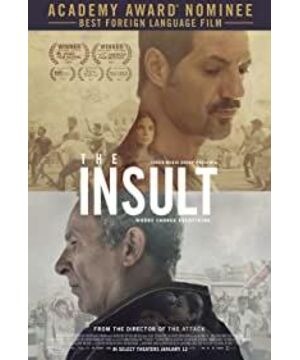Perhaps the most laudable aspect of this film is that it is smooth enough.
An ambitious work that attempts to rise from a private dispute through the courts to the national and national levels, but ultimately loses all care of these two levels, so it is very vague. The director's pioneering point is the national level, but if you think about it, what is his conclusion on the national level: "Both of these two nations have hurt each other." And his conclusion on this big level is still attached to the personal level. In conclusion, because the Lebanese Christian defense attorney used his personal suffering to justify his insulting remarks. What can really express the director's consideration of the national level only exists in the pictures of social public opinion occasionally interspersed in the second half: protests, shouts, flags. But these pictures are just a feint shot to warm up the scene, because at the end, the director threw them away again. Let me ask, a court trial built by social public opinion, after the final trial came out, the director just put it aside In order to gain social momentum and give everything to both parties (in my opinion) embarrassing smiles at each other. At this point, the film ends, and the national meaning that the director wants to present is completely invalid. What's more fatal is that the structure of the film is also broken at this moment, because it is the implantation of the social level that drives the progress of the film and the expansion of emotions. In the process of the progress of this big proposition, it was not only fixed on the material library such as "Crowd Shouting" by the director, but its formalism also eroded the urgency of the human feelings accumulated in the first half of the paragraph. That is to say, the social level and the court form eat back at the core of the character. These two characters have since lost the strength to confront each other, or they have been hypocritically packaged by the director as pursuers of "moral justice", they don't care about broken ribs, induced pneumothorax, implicated wives and daughters and pointed faces Provocative rhetoric insults. Indeed, they cared at first. This is the beginning and turning point of the film. If they didn't care, the film would not have developed. But at the climax, the two lost their personal feud for helping repair the car and eliciting an apology after fighting back. The starting point of annihilating personal enmity is the goodwill, understanding, and counterattack that has nothing to do with the nation, and then these two characters lose their original strength. The two people who suddenly began to pursue morality in the first half of the paragraph have the full meaning of their existence. It is to finish this court debate and use the dignity of the law to end the national justice. The rest is just finished by the lawyer's endorsement in the court, and what is collected is the innocuous "everyone has suffered". tail. In a movie labelled with ethnic conflicts, it is also fatal to use "everyone is a miserable person to understand each other" as the end of the rationale. (In other words, the ending "two peoples are even because they hurt each other" completely sets aside what alien refugees face in another country. social and economic exclusion, the subconscious or even unconscious malice of others), and the final judgment made by the court is also the kind of judgment with a strong sense of presupposition that seems to be most in line with apparent morality. The last smile of the two was full of relief from the tool man who had finally achieved the moral performance target.
It is not an exaggeration to say that it is a standard sugar water tablet, but throwing out the topic without discussing it or using strange substitutes to discuss it is naturally able to finish it smoothly, but it has no value for thinking. Ethnic disputes are all conscious interests and subconscious narrow prejudices. It is extremely irresponsible to conclude with the moral values of "removing the discussion of interests" and "throwing away prejudice". Understanding each other with an understanding that "transcends national boundaries" is also a concept of substitution. Goodwill understanding and extreme discrimination exist objectively at the same time. It is not that the moral sense inspired by the former can replace the latter. The former is emotional morality, while the latter is Emotional immorality (instinctive morality) and material morality. But this trick is the most common way of dealing with film and television, after all, reality is difficult and tricky.
The point of the author's film is not really a cheap production (...) a paper. Often only when the author has no personal opinion but wants to write a paper, he pays more attention to some kind of smooth surface that does not seek depth but only seeks complete structure. . Authors who are truly expressive can dig and expand through a small entry point, but sometimes they don't need to cover everything. This is the real core of nothing to do with funding, producers, distributors, industrial skills, and shooting forms: the author's desire to express, and this is the essence of the author's film. It can be incomplete, narrow, bad looking, and offend the audience, but the words are meant to be said, and there is a lot of information. This is the spirit of the author's film, and this can be seen. Of course, another essential attribute of the author's film is that the film still hopes to be sold and distributed well, so that it can have an audience. As soon as the two lines converge, film expression can be restrained in this relatively free zone: free expression for the audience. Inappropriate parts will naturally be screened out by the creator's self-examination. This is a good natural ecosystem.
Otherwise I have nothing to watch, if I can't see the real opinions and information in this form, after all, their entertainment is very weak to me. Of course, it is on the one hand that I am in a state of slump and not making progress. On the other hand, I just want to see what the contemporary filmmakers are thinking, and how a person's thoughts are framed into scripts and turned into video products. I think this It is a very fascinating process, a process of reconstruction and re-incubation of things, a kind of ability that people can express through media, a kind of capture and release of space, human body and sound, superimposed and cut.
View more about The Insult reviews











